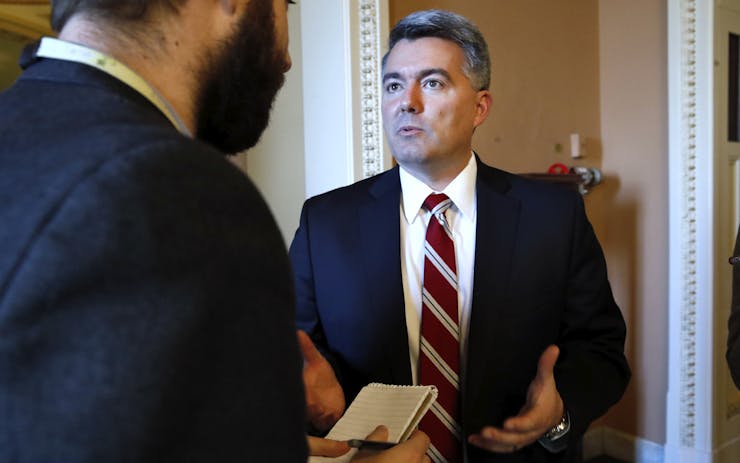Political representatives from Colorado are leading the vanguard of Congressional resistance to U.S. Attorney General Jeff Sessions’ announcement last week that he is rescinding the Justice Department’s Cole memorandum.
Colorado Republican Sen. Cory Gardner is leading the charge. He's expected to meet with Jeff Sessions today.
That 2013 document from the Obama-era Justice Department established a federal policy of non-interference in cannabis-legal states, and created a political environment that allowed the marijuana legalization movement to spread across the United States.
While senators and representatives from California, Washington, and other legal states have expressed outrage over Sessions’ move, Colorado’s Congressional delegation has combined words with actual deeds.
On Wednesday, Colorado Sen. Cory Gardiner, a Republican, is expected to meet with Sessions. Last week Gardner tweeted that Sessions’ announcement “directly contradicts” what Sessions told Gardner before Sessions was confirmed as attorney general.
“With no prior notice to Congress,” Gardner added, “the Justice Department has trampled on the will of the voters in CO and other states.”
This reported action directly contradicts what Attorney General Sessions told me prior to his confirmation. With no prior notice to Congress, the Justice Department has trampled on the will of the voters in CO and other states.
— Cory Gardner (@SenCoryGardner) January 4, 2018
And in a strongly-worded speech on the Senate floor, Gardner – who originally opposed the legalization of cannabis in his state – said he would block Justice Department nominees until Sessions “lives up to the commitment he made to me prior to his confirmation.”
On Tuesday, members of Colorado’s Congressional delegation sent a bipartisan letter to the attorney general, calling on him to reinstate the Cole memo “in order to ensure the Department is acting to uphold the will of Colorado voters and the rights of the states to regulate intrastate commerce.”
Pioneering, Politically Purple State
While lawmakers in other cannabis-legal states have condemned Sessions’ announcement, observers say it makes sense that politicians from Colorado, one of the first states to completely legalize adult cannabis use and a state known for its political diversity, would take the lead on this issue.
'Gardner, who is not a left-wing kook, is clearly furious with what the Justice Department is doing.'
“You’ve seen, since the announcement last week, real pushback from people across the political spectrum,” said Sam Kamin, Vicente Sederberg Professor of Marijuana Law and Policy at the University of Denver and in 2013 a member of Colorado’s task force to implement cannabis legalization.
“Cory Gardner, who’s certainly not a left-wing kook, says that Sessions lied to his face, and (he) is clearly furious with what the Justice Department is doing,” Kamin noted. “I think that what you see here is both frustration with this policy and legislators trying to take some of that power from the executive back to the Congress.”
Kamin said he found the timing of Sessions’ announcement strange, especially since it came just days after California opened its first legal and state-licensed recreational cannabis stores. “He probably would have gotten more bang for his buck if he had done it prior to that,” Kamin noted.
Chaos in California?
The rescinding of the Cole memo has also created more confusion and uncertainty for cannabis-friendly states, as cannabis consumers and businesses in legal states are now less protected from the whims of U.S. Attorneys across the country. As the Associated Press pointed out, Session’s actions have “left the issue to a mix of prosecutors who were appointed by President Donald Trump’s administration and others who are holdovers from the Barack Obama years.”
And that, according to Kamin, can be a recipe for legal chaos. “California has four different U.S. Attorneys, one in each quadrant of the state,” he said, “and they could develop different (cannabis) policies in the four different parts of California.”
But there is hope that Sessions’ action will light a fire under efforts by the Congressional Cannabis Caucus, a bipartisan group of pro-legalization lawmakers established last year.
Watch the Cannabis Caucus Membership
For his part, Kamin said he’s curious to see if the caucus gains more members in the wake of the attorney general’s actions.
Another issue to watch takes place next week. That’s when the Rohrabacher–Blumenauer amendment, a budgetary measure prohibiting the use of federal funds to arrest or prosecute people who abide by state regulations in states that have legalized medical marijuana, is scheduled to expire.
There are currently at least four marijuana-related bills awaiting Congressional representatives as they return from the holiday recess. Last week Colorado Rep. Ed Perlmutter, a Democrat and co-sponsor of several of those bills, said it was time for Congress to take matters into its own hands when it comes to protecting the legal marijuana industry.
“We’ve come too far to backtrack on this issue now,” Perlmutter said in a press statement. “It’s time to find a real solution that will keep our communities safe and respect the will of voters in the majority of states in our country.”





